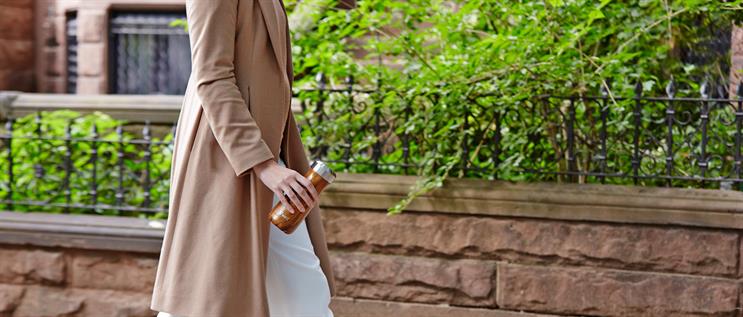With celebrity fans such as the Beckhams, Ellie Goulding and Julia Roberts, reusable water bottle company S’well has established a cosy niche in the sustainability market as a high-end lifestyle brand.
But so far S’well, which launched in 2010, has relied mostly on social media, word of mouth and brand collaborations with the likes of Swarovski, Liberty London and Kourtney Kardashian’s Poosh to promote its product. Now S’well has a new chief marketing officer at the helm – Josh Dean, who took over in June as only its second-ever CMO – to expand the brand beyond its loyal bottle carriers.
Sustainability has become a social trend, but Dean insists S’well was eco-savvy "before it was cool". To stand out from the crowd of do-good brands, S’well is creating new products and tapping into vintage ideals as it ramps up marketing efforts. The brand wants to become not just a water bottle but a water provider, with initiatives such as a partnership with Unicef to provide access to clean water in Madagascar.
"We’re already at a point where, without the bottle, people feel like there’s something physically missing in their lives – and that’s an amazing place for a brand to be in," Dean says. "But we have a responsibility and opportunity to move beyond the bottle."
Moving backwards
Among S’well’s new ventures are plans to help reintroduce water fountains across the UK and the US. Fountains existed as far back as 2000 BC and were once artistic focal points of parks and train stations across the globe. Over time, however, many have become redundant with the rise of single-use plastic bottles.
"We want to be associated with bringing the humble water fountain back to London or New York, regardless of whether users own one of our bottles, because we know that’s going to drive tremendous brand loyalty, advocacy and love," Dean explains. "It’s not just enough to provide a reusable bottle – we need to work with cities, communities and countries to be able to provide the infrastructure to let people access tap water wherever they need to go."
Although it sounds like a pipe dream (no pun intended), S’well is opening hydration stations on London's Oxford Street in the autumn through a joint venture with John Lewis & Partners and expects to launch water fountains in New York next year.
Much of S’well’s vision for a more sustainable future harks back to innovations and ideas that already exist. For example, the brand draws inspiration from practices such as milkmen who circulated bottles on battery-powered floats. Such concepts could hold the key to reducing single-use plastic today, Dean believes.
"I always look back and think so many of the answers for today existed 20 years ago, but for whatever reason have either been forgotten about or out of fashion. A lot of this is about – I hate to say it – making these things cool again in 2019," he continues.
As it stands, about 10.7 billion pieces of food packaging for lunch are dumped annually in the UK alone, according to environmental charity Hubbub, with the average person using roughly 167 plastic bottles every year.
With this in mind, S’well is set to unveil its latest product, Eats – insulated food containers that allow customers to buy food on the go without resorting to single-use plastic, in a similar way to people bringing their own coffee cups to a café. The brand will work with lunch hotspots to launch a discount service for anyone who fills up with their bowl instead of using a plastic takeaway box.
Telling the brand’s story
One of S’well’s savviest growth strategies was when founder Sarah Kauss worked alongside the New York mayor to gift 320,000 bottles to students across all five boroughs of the city, helping to widen the brand’s consumer base. The move flipped around the classic parent-to-child filtration system of behaviour-change marketing. Dean says children have been quicker to embrace S’well than their parents, encouraging their mums and dads to stop buying plastic water bottles at the shop.
"Here at S’well, we’re kind of in the waste reduction business," Dean says. "There’s an emotional component to reducing the amount of plastic waste you put out there – the Marie Kondo effect of sparking joy in longer-lasting things."
On the other hand, the brand’s summer campaign – the first under Dean’s command and launching during the most popular season for hydration products – doesn’t mention sustainability at all. Featuring two attractive twenty-somethings dancing with their bottles, the festival-ready "Hit the road" ignores the eco-friendly message that S'well has pioneered. This will help the brand stand out from competitors, Dean believes.
"Sometimes, you don’t have to shout from the rafters and say we’re sustainable. There’s a way you can weave sustainability into the content being created and the stories being told," he adds.
He continues: "Moving forward, we are going to be more consistent about how we talk about style and sustainability and bringing them together, in addition to working on the infrastructure of cities to be able to provide accessible tap water."
Although fashion and sustainability are often pinned on opposite sides of the spectrum (especially in the context of fast fashion), S’well’s reputation as a high-end lifestyle brand could help it achieve the balance between green and garish. It’s not a matter of reinventing the wheel – it’s just a matter of telling the right story.


